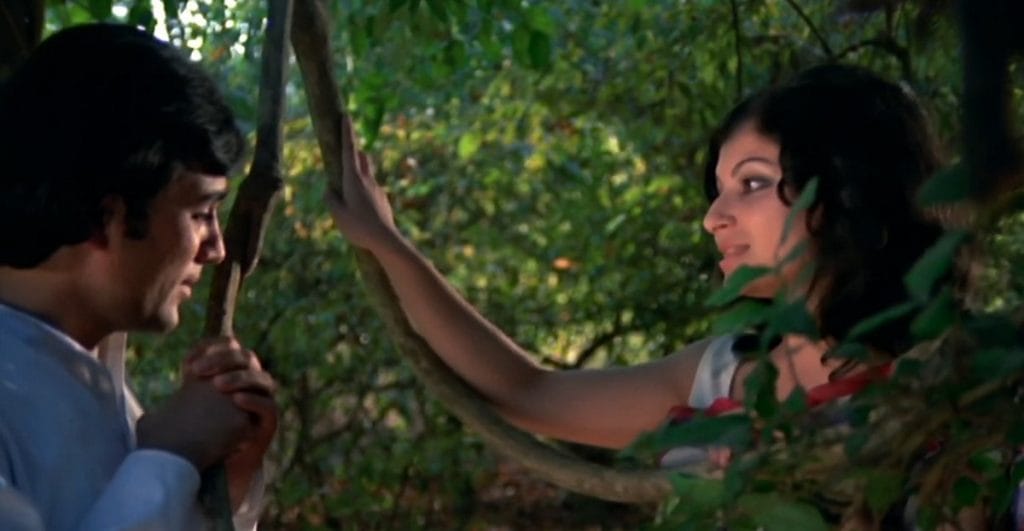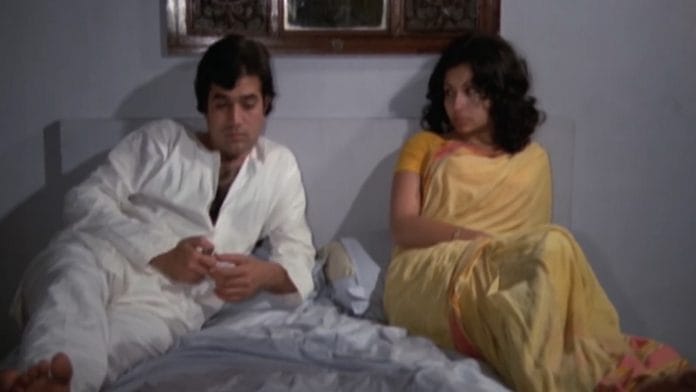Amar stands in the dark, holding a bouquet of rajnigandhas. He overhears his wife tell a friend she doubts he’ll remember their anniversary. Silently, he drops the flowers, rings the bell, and pretends the date has slipped his mind.
This moment in the 1974 film Aavishkar, starring Rajesh Khanna as Amar and Sharmila Tagore as his wife Mansi, sets the tone for Basu Bhattacharya’s portrait of a marriage unravelling. Not through melodramatic shouting or betrayal but through silence, sniping, and fatigue.
Marriage was a recurring theme for Bhattacharya. Aavishkar was the second film in what is often called his marriage trilogy, with the others being Anubhav (1971) and Griha Pravesh (1979), both starring Sanjeev Kumar. Aavishkar is arguably the most subtly devastating of the three.
Set over the span of a single night, interspersed with flashbacks, its 105 minutes are a granular exploration of how resentment replaces romance.
The night in question is the couple’s second wedding anniversary. Amar, who works in advertising, chooses to go out for a film with his colleague Rita (Minna Johar) but in a flash of nostalgia decides to buy his wife flowers. Back home, Sunil (Devendra Khandelwal), Amar’s childhood friend, is already at their home, chatting with Mansi. That’s when Amar overhears the conversation and later feigns surprise when Sunil congratulates him. The film slowly draws the audience into Mansi and Amar’s stifling relationship, which on the surface seems perfect, complete with a child.
Shot inside the house Bhattacharya shared with his then-wife Rinki, Aavishkar was inspired by his own troubled marriage.
“Aavishkar is the most autobiographical of his films. My saris were used. Some of the scenes were straight out of our life, out of our courtship period… The way the wife holds on to her ego,” Rinki Bhattacharya once said in an interview.
Perhaps it’s this mooring in reality that gives the film its lasting resonance, even fifty years on.
Also Read: ‘Abhinetri’ starts conversation on married women and work. Happy, neat ending takes priority
Anatomy of failing marriage
A soulful montage introduces the couple, as Manna Dey sings the mournful Hansne Ki Chah Ne Kitna. From courtship to Mansi being slapped by her father for being in a relationship, and eventually eloping, the hazy visuals capture a romance that has since faded into a lifeless, disillusioned marriage.
Bhattacharya teases the possibility of an affair in Aavishkar through Rita’s advances to Amar. Early in the film, when she walks in while Amar is working, she says: “Shaadi-shuda aadmi toh jyadatar akela hi hota hai, na?” (A married man is mostly lonely, isn’t he?) From her body language, it’s obvious she’s flirting. She rests her hand on his shoulder and stares into his eyes as she hints at the dissatisfactions of marriage.
In the dark theatre too, her fingers slowly caress Amar’s hand. He clutches her hand for a moment before releasing it. The scene then cuts to a flashback of him and Mansi at the beach, laughing.

Bhattacharya uses this constant juxtaposition of the past and present to show how even the happiest couples can fall out of love. The songs, such as Naina Hai Pyase Mere and Babul Mora Naihar Chhooto Hi Jaaye, are used to emphasise how their lives have changed.
There’s a sense the couple are at a critical juncture and things could go either way. Amar does not encourage Rita, but he does not exactly discourage her either. It’s as if Bhattacharya wanted to show infidelity as a choice. It’s something Amar probably thinks of, but does not act on. In Griha Pravesh, the next film in the trilogy, another Amar (played by Sanjeev Kumar) goes further, has an affair, and pays the price.
Aavishkar never spells out why Amar and Mansi are drifting apart. The answers lie in the everyday disappointments, the pressure of work, and missed chances at connection.
They stare at each other blankly, sometimes with rage. Their silences speak louder than their words.
There is, however, an unsettling undertone of violence—in how they lash out, or in how Mansi’s father treats her. Every interaction brings a sense of something darker simmering beneath the surface.
Also Read: Hariyali Aur Rasta was a romantic drama that questioned arranged marriages
Only one happy ending
You don’t watch Rajesh Khanna and Sharmila Tagore in Aavishkar. You watch Amar and Mansi, two ordinary people struggling. Bhattacharya’s dexterity in making two of the biggest stars of the time seem so human is one of the reasons why the film is so thought-provoking.
In Dark Star: The Loneliness of Being Rajesh Khanna, Gautam Chintamani writes that it was Sharmila Tagore, a close friend of Khanna, who suggested his name for the role. Known for his charm, his mannerisms, and a run of 15 consecutive hits at one point, Khanna completely becomes Amar. His tired eyes and hunched shoulders evoke a man worn down by the grind of a private job and a difficult marriage. The performance fetched him his third and final Filmfare Best Actor Award.
“Watching Khanna and Sharmila together in Aavishkar is almost like watching a couple you know fall apart right in front of your eyes,” writes Chintamani.
Tagore, famous for glamorous roles in films like An Evening in Paris (1967), appears in a simple cotton saree for most of the film. Devoid of any makeup or jewellery, she looks tired and mentally exhausted. As a wife whose husband expects her to anticipate his needs without being told, she is both tender and angry.
In one scene, she tells Amar, “Kabhi muh khol kar kaha kya chahiye tumhe? Kya hai jo tumhe nahi milta mujhse? Tum chahte ho tumhari mann ki baat bina bole main samajh jaun.” (Have you ever said what you want? What is it that you don’t get from me? You want me to read your mind.)
At one point, Bhattacharya uses the metaphor of a stray nail hammered on a wall to symbolise Amar and Mansi’s marriage. She asks him not to pull out the nail, or it would shatter him. But just when it looks like the relationship is almost unsalvageable, she finds the bouquet of rajnigandhas he had left outside the night before.
While Amar and Mansi find their way back to each other, the director and wife did not have a happy ending. Rinki left Basu in 1983, alleging domestic violence, and later even edited an anthology about the subject. But she’d made her peace, saying: “I have nothing against Basu. The poor man has suffered in his own way.”
Aavishkar Cast:
Rajesh Khanna as Amar
Sharmila Tagore as Mansi
Satyen Kappu as taxi driver
Dina Pathak as taxi driver’s wife
Monika Jashnani as a child artist
Devendra Khandelwal as Sunil
Minna Johar as Rita
Composer: Kanu Roy
Director and Producer: Basu Bhattacharya
Views are personal.
(Edited by Asavari Singh)






